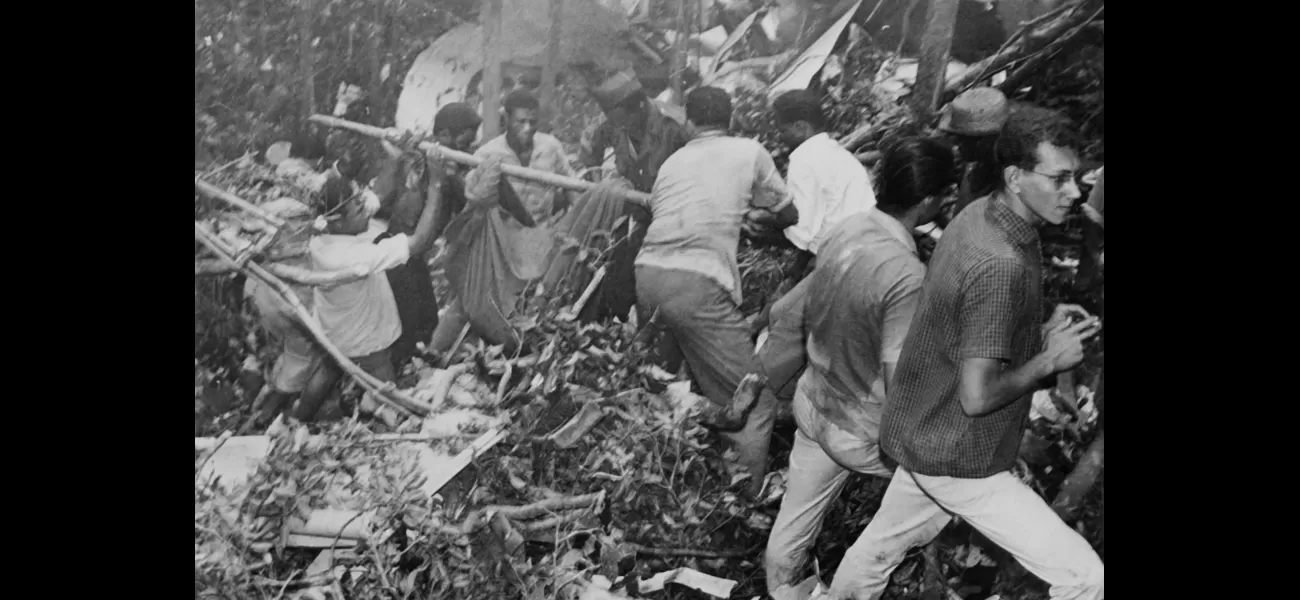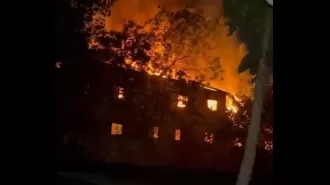The investigation into the fatal Air France crash, which claimed 113 lives, remains unsolved.
Tragedy struck Guadeloupe, a Caribbean island, 62 years ago.
June 22nd 2024.

As the sun set on the idyllic island of Guadeloupe, a tragedy struck that would leave the world reeling. It was 62 years ago when an Air France Boeing jet crashed into a mountainside, claiming the lives of 113 people. The aircraft, a Boeing 707-328, was on its scheduled long-haul route from Paris to Santiago, Chile, with layovers in Lisbon, the Azores, Guadeloupe, and Peru.
The disaster unfolded as the plane attempted to make its descent into the island's second town, Pointe-à-Pitre. The exact reason for the crash remains a mystery, but it is believed that bad weather and lack of information may have played a role. Despite the aircraft being just four months old, all 103 passengers and 10 crew members perished in the explosion that occurred on a forest hill on June 22, 1962.
This tragic incident is still considered the 11th worst involving a Boeing 707, but details of the cause are scarce. At the time, black boxes, which record all flight data, were not yet installed on commercial planes. The US would not make cockpit voice recorders a requirement until 1967, for planes with four or more engines. The conditions on the day of the crash were far from ideal, with violent thunderstorms and low-hanging clouds. Adding to the difficulty, the VOR navigational beacon was out of service.
The thunderstorms caused the plane to stray 9.3 miles off course, disrupting the automatic direction finder readings. The crash occurred on a hill known as Dos D'Ane, which translates to "The Donkey's Back," at an altitude of approximately 1,400 feet. The aftermath of the crash was devastating, and it came just three weeks after another Air France Boeing 707 had crashed on June 3, 1962.
An investigation into the circumstances revealed a deadly combination of factors, including insufficient weather information provided to the crew, failure of the ground equipment, and the atmospheric impact on the automatic direction finder. Air France's pilots also criticized the underdeveloped airports, like Guadeloupe's, for not being properly equipped to handle modern jets. This sentiment was echoed by Tex Johnston, chief test pilot at Boeing Aircraft, who claimed in his 2014 autobiography that Air France's crews were often ill-prepared for training sessions and that the aircraft may not have been properly serviced at times.
As the funeral services were held for the 113 victims in Guadeloupe, the world mourned the tragic loss of life. To this day, the exact reason for the crash remains a mystery, but it serves as a reminder of the importance of safety measures and proper training in the aviation industry. The grim aftermath of the crash will always be a haunting reminder of this terrible tragedy.
The disaster unfolded as the plane attempted to make its descent into the island's second town, Pointe-à-Pitre. The exact reason for the crash remains a mystery, but it is believed that bad weather and lack of information may have played a role. Despite the aircraft being just four months old, all 103 passengers and 10 crew members perished in the explosion that occurred on a forest hill on June 22, 1962.
This tragic incident is still considered the 11th worst involving a Boeing 707, but details of the cause are scarce. At the time, black boxes, which record all flight data, were not yet installed on commercial planes. The US would not make cockpit voice recorders a requirement until 1967, for planes with four or more engines. The conditions on the day of the crash were far from ideal, with violent thunderstorms and low-hanging clouds. Adding to the difficulty, the VOR navigational beacon was out of service.
The thunderstorms caused the plane to stray 9.3 miles off course, disrupting the automatic direction finder readings. The crash occurred on a hill known as Dos D'Ane, which translates to "The Donkey's Back," at an altitude of approximately 1,400 feet. The aftermath of the crash was devastating, and it came just three weeks after another Air France Boeing 707 had crashed on June 3, 1962.
An investigation into the circumstances revealed a deadly combination of factors, including insufficient weather information provided to the crew, failure of the ground equipment, and the atmospheric impact on the automatic direction finder. Air France's pilots also criticized the underdeveloped airports, like Guadeloupe's, for not being properly equipped to handle modern jets. This sentiment was echoed by Tex Johnston, chief test pilot at Boeing Aircraft, who claimed in his 2014 autobiography that Air France's crews were often ill-prepared for training sessions and that the aircraft may not have been properly serviced at times.
As the funeral services were held for the 113 victims in Guadeloupe, the world mourned the tragic loss of life. To this day, the exact reason for the crash remains a mystery, but it serves as a reminder of the importance of safety measures and proper training in the aviation industry. The grim aftermath of the crash will always be a haunting reminder of this terrible tragedy.
[This article has been trending online recently and has been generated with AI. Your feed is customized.]
[Generative AI is experimental.]
0
0
Submit Comment





